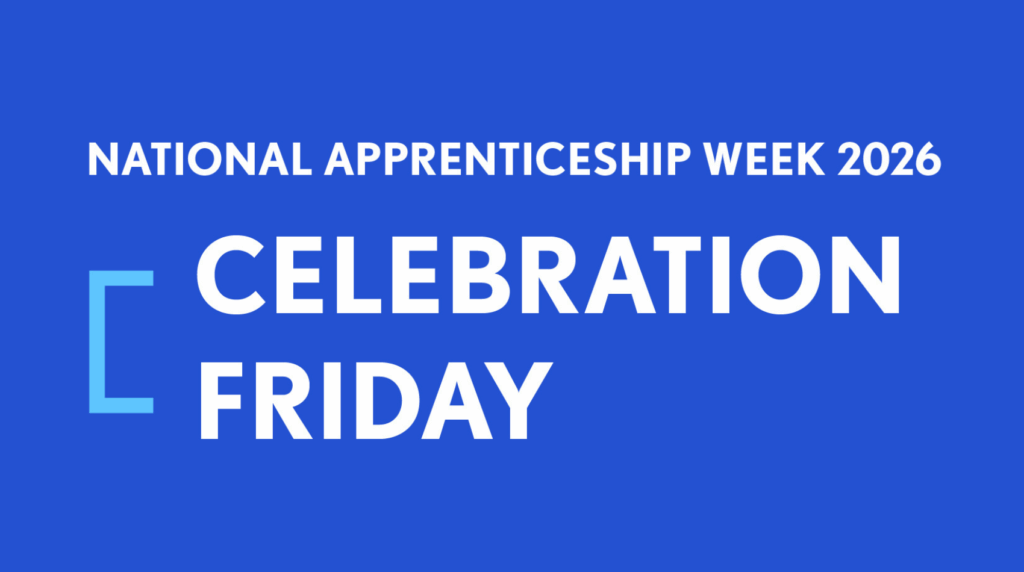Abi Hickey,
Content Creator
1st August 2024
How can small businesses can use apprenticeships for growth and skill development?
Bringing an apprentice on board can be a transformative move for small businesses. If you’re eager to pass on your expertise to someone new to the field or seeking a cost-effective way to expand your team, hiring an apprentice might be an excellent opportunity for your business’s growth. But you can also use apprenticeship training to upskill your current workforce.
If you’re contemplating this step but unsure where to begin, this guide will outline the process and detail the advantages.
What is an apprenticeship?
An apprenticeship is a structured programme that combines on-the-job training with classroom learning (this could be done remotely or in person) these courses are designed to equip the learner with specific skills and knowledge in their chosen sector/course. It will allow the learner to gain knowledge from experienced professionals. Apprenticeships are offered in many sectors and can be at various levels which lead to a recognised qualification or certification allowing them to either be hired into the business they were trained in or join the job market with months of experience in a specific sector.
How are apprenticeships funded?
If you are concerned about the costs of training an apprentice? Don’t worry! – Apprenticeships are funded via the apprenticeship levy which UK employers pay into monthly. From this employers can fund their training from their levy pot.
The government values apprenticeships for all businesses and individuals and offers significant financial support to help make them affordable for small businesses.
Here’s a quick overview:
Government Funding: Depending on whether your business pays the apprenticeship levy, you may only need to cover 5% of the training and assessment costs, with the government covering the remaining 95%.
Additional Support: Small businesses can also receive a £1,000 grant to assist with supporting your apprentice in the workplace. This is particularly beneficial for young apprentices and can be used for expenses such as training materials, equipment, or travel.
When hiring an apprentice it is important to remember:
- They have to be over 16 and not be in full-time education
- The apprentice has to receive a salary of at least minimum wage
- They will also have to be entitled to sick pay and annual leave
- Finally, they will need dedicated time to study during work hours – this is normally around 20%
What is the Apprenticeship Levy?
The Apprenticeship Levy, introduced on 6 April 2017, is a government initiative aimed at boosting the number of apprenticeships available across the UK. It achieves this by collecting funds from the country’s largest and most successful businesses.
This means that regardless of the sector, all employers with a payroll of over £3 million per annum are required to pay the Apprenticeship Levy. If you don’t pay into this levy pot or don’t have enough funds in your levy pot then you’ll need to pay 5% of the training and assessment costs for your apprentice. But due to Labours apprenticeship plans if you hire an apprentice under the age of 22 then you will be fully funded. This means that you won’t have to pay the 5% training fee.
But this isn’t the only way you can be funded for an apprenticeship! Many companies that have a large levy pot are willing to help fund small businesses. We have some great links with levy employers who are open to sharing their funding to support local businesses.
What are the different apprenticeship levels?
Apprenticeships are offered at various levels, each corresponding to different stages of skills and qualifications. Here’s a breakdown of the different apprenticeship levels:
Intermediate Apprenticeship (Level 2): Equivalent to GCSEs, this level provides foundational skills and knowledge in a specific trade or profession. It’s often the starting point for apprenticeships and focuses on basic competency.
Advanced Apprenticeship (Level 3): Equivalent to A-levels, this level builds on the skills learned at the Intermediate level. It involves more complex tasks and responsibilities, preparing apprentices for more advanced roles or further training.
Higher Apprenticeship (Level 4 and above): These apprenticeships are equivalent to higher education qualifications, such as a higher national certificate (HNC) or foundation degree. They offer advanced technical skills and knowledge, often leading to supervisory or management roles.
Degree Apprenticeship (Levels 6 and 7): Equivalent to a bachelor’s or master’s degree, these apprenticeships combine work experience with academic study. They are designed for roles that require a high level of expertise and often lead to professional accreditation.
Depending on the different level of the apprentice the requirements can vary for the apprentice themselves.
Benefits of using apprenticeship training
Bringing an apprentice into your business but also using employees who are already in the business can offers a range of advantages that can significantly impact your company’s growth and success and are overall a smart investment.
Tailored skill development
Apprenticeships allow you to shape your apprentice’s skills to your specific business. Instead of hiring someone with a fixed set of skills. This tailored training helps create an employee who is not only highly familiar with your business but also eager to learn more. But also can also enhance the overall skill of your team and address any skills in expertise.
Fresh perspectives
Apprentices bring fresh ideas and perspectives tp your business. They are often eager to apply new skills and knowledge, which can lead to innovative solutions and improvements in your team.When bringing in an eager apprentice it can help to stimulate your employees.
Future Leadership Potential
By training apprentices, you’re also cultivating potential future leaders for your business. As apprentices progress through their training, they gain a deep understanding of your company’s operations and values, positioning them well for future leadership roles.
Community and Industry Engagement
Hiring apprentices can enhance your company’s reputation within the community and industry. It shows that you’re actively contributing to the local economy and supporting the next generation of professionals.
Strategic benefits beyond staffing
Incorporating apprentices into your business offers more than just a staffing solution; it’s a strategic move that can lead to significant benefits for your company. From cost savings and upskilling your workforce to building future leaders, apprenticeships offer a range of advantages that can drive your business forward.
Conclusion
As you consider the potential of apprenticeships, remember that this investment goes beyond filling a position—it’s about nurturing talent, enhancing your workforce, and creating a sustainable path for future success. Embracing apprenticeships can help you build a stronger, more resilient business while supporting the next generation of professionals. Dive into the opportunities that apprenticeships offer and watch how they can transform your business for the better.
————–
For further insights and guidance on maximising your apprenticeship funding, please don’t hesitate to reach out to us at:
Tel: 023 8017 0380
Email: hello@kiwieducation.co.uk
Kiwi & Yuzu Ltd is committed to empowering businesses and individuals through quality education, training, and skills development.
Employers
Read More
Individuals
Available Courses
International
Our Partnerships


